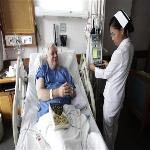
Asia is being seen as a growth center in the globalization of health services thanks to rising demand from developed countries as well as the region's expanding middle class. But there are concerns that so-called medical tourism will shift resources away from public to private health care systems.
Over much of the past 10 years Thailand has led the growing medical tourism market, as foreigners sought lower cost health services and ready access to treatment.
The services available range from complicated cardiac surgery, to cosmetic surgery to dentistry and even alternative care, such as Chinese medicine, yoga and traditional Ayurvedic treatments.
Rising international travel and the availability of information on the Internet have boosted the number of travelers seeking treatment.
In Thailand, as many as 1.4 million visitors arrived seeking medical care in 2007, the most recent year numbers are available - up from half a million in 2001. Medical tourism brought in $1 billion in 2007 and that is expected to triple by 2012, when the Health Ministry expects more than two million medical tourists.
The largest numbers come from the European Union, followed by the Middle East and the United States.
Kenneth Mays, international marketing director for Bumrungrad International Hospital in Bangkok, says the high standard of care has been a drawing card.
"I think Thailand offers a very ideal combination of medical quality and service quality. There are both private and public hospitals and it's very consumer driven because most people pay for their own medical care. Americans will come here because it could be 60 to 80 percent less expensive for equivalent treatment," said Mays.
But Thailand faces growing competition as more countries invest in medical services. Singapore, Malaysia, South Korea and the Philippines are all promoting medical tourism.
Ruben Toral, chief executive officer of health industry consulting firm Medeguide, says more people will weigh low cost against quality guarantees when choosing destinations for treatment.
"You will pay for Singapore but you absolutely know what you will be getting. There is a legal system effectively to gurantee that. So, if you want absolute guarantees, you go to Singapore. If you want absolute price, you go to India. I think Thailand and Malaysia right now represent the value plays - good quality, great service, good product," said Toral.
He says medical tourism is likely to grow.
"Asia will be and will continue to be the dominant force in medical tourism. Why? Because this is where you find number one the world's biggest chunk of population - really between India and China there you have it, two-thirds of the population just settled in this area. And this is also where you have a major emerging middle-class market," he said.
Toral says that aging patients from North America, Europe, Australia and Japan also will look for places with plenty of access to low-cost care.
But there are concerns that increased investment in medical services for the wealthy will draw resources from the region's public hospitals.
Critics say many public health facilities already are under strain and fear more professionals will abandon the public system for private practice.
Viroj Na Ranong, an economist with the Thailand Development Research Institute, a policy research agency, fears that shift is under way.
"When you compare the purchasing power - the foreign purchasing power would be much higher than the middle-class or upper-class purchasing power in Thailand. This is a fundamental issue whenever there is a burst of foreign patients then the doctor would be drawn to the private sector," said Viroj Na Ranong.
Thailand's National Health Commission reports that scores of medical specialists have moved from the state system to private health care.
The National Institute of Development Administration says medical tourism has exacerbated shortages of physicians, dentists and nursing staff in public facilities.
But Bumrungrad's Mays doubts those claims.
"It doesn't hold up to serious mathematics because if you do the math, Thailand sees about 1.4 million medical travelers each year from outside of Thailand. That is a fraction of the total visits to doctors and admits [admissions] from Thais themselves," said Mays. "It's very important to the country's economy and has a lot of advantages to the country - but we don't think it's really taking a lion's share of resources or too many resources from Thais themselves."
May says that due to expanding private health care in Thailand - and limits on foreign doctors working in the country - there has been a reverse brain drain; Thai medical workers employed overseas are returning home.
Other medical professionals say many work part-time at private hospitals and also serve in public hospitals.
Several medical industry analysts say Asia's rising economic strength and increasing investment in health services will be able to meet demand for affordable care both for people in the region and for world travelers.
Ayurvedic: the ancient Hindu science of health and medicine 古印度醫(yī)藥學
drawing card: an attraction drawing large audiences.(能吸引大批觀眾的人或物)
Related stories:
醫(yī)療游客 medical tourist
生態(tài)旅游
民調(diào):泰國最好客 法國最不熱情
自助游怎么說
黑色旅游 dark tourism
(來源:VOA 編輯:陳丹妮)